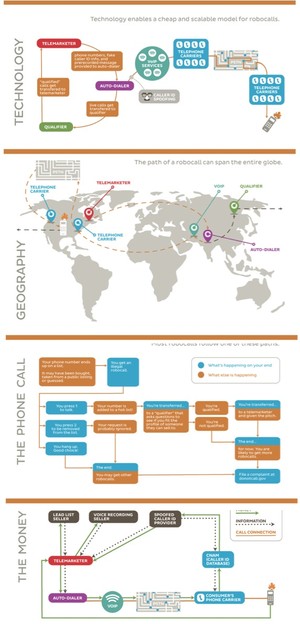Stop Robocalls!
Are you as annoyed as we are by automated pre-recorded spam calls on both your landline and your mobile phones? In the U.S., this practice is out of control. and the legal framework that does exist to prevent calls containing automated marketing recordings is not being enforced. The good news is that, as of October 16, 2013, in the U.S., written consent is legally required for consumers to receive pre-telemarketing and autodialed calls on their mobile phones. The bad news is that many spammers will ignore this law.
The fact that automated calls are being misused by spam marketers casts suspicion on the kinds of automated calls most of us appreciate getting: reminders about appointments, or notifications that a flight is delayed.
I enjoyed reading Ronni Marshak’s informative article this week about how robocalling works and what technology solutions are emerging to help you avoid such calls.
How Does a Robocall Work?
© 2013 Federal Trade Commission
But it reminded me that customer-unfriendly practices involving the telecoms industry eventually DO get regulated out of practice. Remember the days when you couldn’t keep your phone number the same when you changed mobile phone carriers? Now, thanks to the customer revolution and ensuing regulation, mobile phone carriers around the world are supposed to let you keep your phone number when you switch phone companies. Wikipedia provides a good source of updated information on mobile phone number portability by country here.
Looking at the three technology solutions that were highlighted in the FTC RoboCall Challenge, they all seem to rely on blocking calls from a particular phone number. But, as we know, the phone spam industry is technically adept, and they can easily spoof phone numbers and place calls by computer with no legitimate caller id that is tied to the actual source of the call. There are phone call blocking solutions that can be implemented—both on the software side using spam filters and spam reporting—and on the carrier side, like RoboChoice, and on the consumer side, like Digitone (a piece of hardware you install on your landline).
But consumers shouldn’t have to take explicit action. Unsolicited robocalling should be illegal and enforced. My suggestion is this: we need an international consumer movement to create pressure on telecoms companies and telecoms regulators to block robocalling spammers using technology to destroy the quality of our experience when using our phones (both cell phones and landlines). Let’s make sure that unwanted robocalling goes the way of mobile phone number lock-in.
Oh, and please make sure you boycott any brand that does use robocalling for unsolicited marketing!
Robocalls: Annoying and Illegal
Avoid This Customer-Unfriendly Practice Except for Appointment Reminders
By Ronni T. Marshak, EVP & Sr. Consultant/Analyst, Patricia Seybold Group, November 14, 2013
(Read the short sample and download the full article in PDF.)
0 comments
Be the first one to comment.



